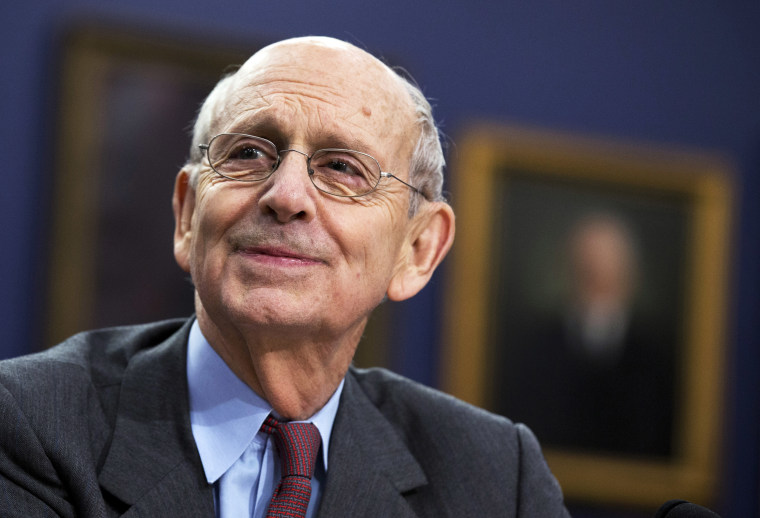After Donald Trump's third Supreme Court nominee was confirmed last fall, many on the left took solace in the fact that President Joe Biden's victory would at least stop the judicial bleeding. Justice Stephen Breyer could finally retire at a time in which there was a Democratic White House and a narrow Democratic majority in the Senate.
At least, that was the idea at the time.
The center left justice, who celebrated his 83rd birthday last week, has spent much of 2021 defending his reluctance to step down from the high court -- including arguments that the broader political context can and should be ignored.
"My experience of more than 30 years as a judge has shown me that, once men and women take the judicial oath, they take the oath to heart," Breyer argued during an appearance at Harvard Law School in May. "They are loyal to the rule of law, not to the political party that helped to secure their appointment."
Two months later, the justice sat down with CNN's Joan Biskupic and sounded very much like a jurist who intended to stick around for a while, indifferent to the political circumstances.
Yesterday, however, Breyer spoke to The New York Times' Adam Liptak -- ostensibly to help promote the justice's new book -- and his comments about his professional future sounded a little different from what he said in the spring.
He recalled approvingly something Justice Antonin Scalia had told him. "He said, 'I don't want somebody appointed who will just reverse everything I've done for the last 25 years,'" Justice Breyer said during a wide-ranging interview on Thursday. "That will inevitably be in the psychology" of his decision, he said.
The observation may seem obvious, but it was a rare acknowledgement from the longtime justice: Breyer acknowledged the possibility that by delaying his retirement further, he increased the risk that his successor would be ideologically opposed to everything he's done on the bench.
Nearly 20 years ago, then-Chief Justice William Rehnquist was asked whether it was "inappropriate for a justice to take into account the party or politics of the sitting president when deciding whether to step down from the court."
The conservative jurist replied at the time, "No, it's not inappropriate. Deciding when to step down from the court is not a judicial act."
When the Times reminded Breyer yesterday about Rehnquist's comments, he seemed to endorse the sentiment, saying, "That's true."
To be sure, I'm one of many looking for clues and hints about the justice's plans for the future. That said, there are subtle, qualitative differences between his comments this week and his comments from the spring.
What's more, if Breyer is mindful that his future replacement might "just reverse everything" he's done for the last quarter-century, time is of the essence.
As we discussed in May, if Breyer assumes that a Republican-led Senate -- which is likely in 2023, if not sooner -- would confirm a Biden nominee for the Supreme Court, I suspect Attorney General Merrick Garland would happily take the justice's call. (Historical trivia: It's been 126 years since a Republican-led Senate confirmed a Democratic president's pick for the high court.)
We're talking about conditions in which GOP senators kept a Supreme Court seat vacant for 11 months in 2016 for purely partisan reasons, with some Senate Republicans suggesting they'd keep the seat empty indefinitely until their party controlled the White House again.
Breyer has a responsibility to at least recognize this political landscape and weigh his legacy accordingly.

